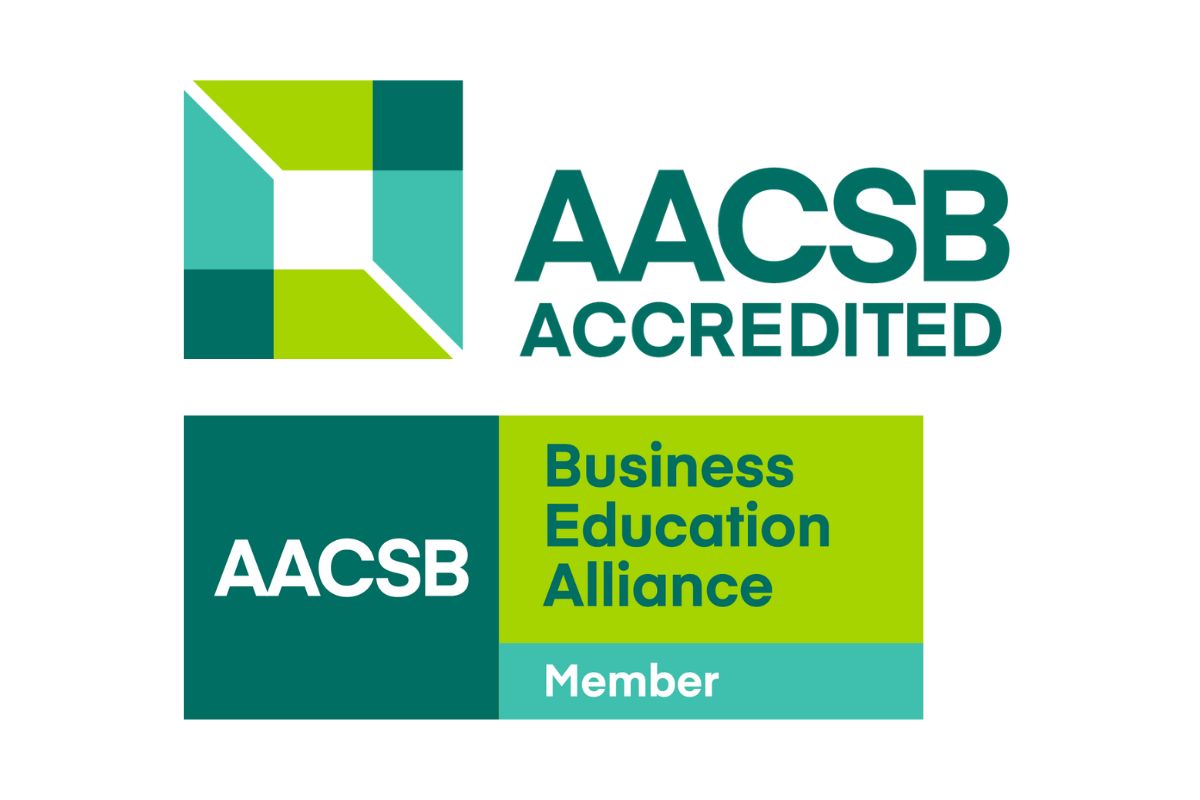
International Business MSc
Start Dates
21 September 2026
Duration
1 year full-time
Overview
Why choose Huddersfield for this course?
- Our MSc courses let you choose from three final project routes - Research, Consultancy, or New Venture Creation - so you can tailor your studies.
- Study at an AACSB-accredited Business School. Globally, fewer than 6% of institutions offering business degrees achieve this accreditation.
- Study at the Times Higher Education Business School of the Year 2023.
Accreditation and Professional Links
Recognised connections to give you an extra edge when you graduate. Read More
Want to thrive in the fast-paced world of international commerce? Our MSc in International Business is designed to equip you with the knowledge and skills needed to excel in a dynamic global business environment.
Whether you aspire to work for a multinational corporation, launch your own international venture, or pursue a leadership role in a global organisation, this course provides a deep dive into the key areas of international business strategy, management, and operations. You will explore core topics such as globalisation, international trade, and cross-cultural management, enabling you to develop a critical understanding of the challenges and opportunities facing organisations in the international arena.
To enrich your learning experience, you’ll engage with real-world business case studies and benefit from insights shared by industry experts. Additionally, our emphasis on sustainability and innovation will prepare you to lead responsibly in a complex global economy. By gaining hands-on experience through practical assignments and group projects, you’ll build the expertise and confidence to navigate international markets, making you highly employable and ready to take on the challenges of a globalised business landscape.
Entry Requirements
Entry requirements for this course are normally:
- An Honours degree (2:2 or above), in any subject or an equivalent qualification.
- Applicants with other professional qualifications and/or experience will be considered on an individual basis.
- In exceptional cases students with no appropriate qualifications but relevant work experience, who can demonstrate ability to benefit from postgraduate study, will be considered on an individual basis. Candidates’ suitability will be assessed in line with the University’s Accreditation of Prior Experiential Learning procedures.
- Students wishing to transfer to MSc International Business from other awards or other universities will be considered on an individual basis upon evaluation of the modular credit and learning outcomes already achieved.
If your first language is not English, you will need to meet the minimum requirements of an English Language qualification. The minimum for IELTS is 6.0 overall with no element lower than 5.5, or equivalent. Read more about the University’s entry requirements for students outside of the UK on our International Entry Requirements page.
Course Details
You will also choose three optional module in this year. The current optional modules are:
For more information on when and how we update our modules please see the ‘Legal Information’ section below.
An opportunity to pursue an area that interests you or which you are passionate about comes in your choice of project. You have a choice of three routes: Research Route, Consultancy Route and Entrepreneurship Route (subject to tutor approval). Please note, May starters will only be able to undertake the Research Route.
Teaching and Assessment
Discover what to expect from your tutor contact time, assessment methods, and feedback process.
Your Career
Previous graduates from courses in this subject area have gone on to work in a variety of roles such as Data Scientist, Logistics and Distribution Manager, Marketing Executive, Management Consultant, Arbitrator and Business Development Manager.*
*Source: Prospects
98%
Percentage of our postgraduate students go on to work and/or further study within fifteen months of graduating.
* HESA Graduate Outcomes 2022/23, UK domiciled.
£38.5k
Average salary of our postgraduate students fifteen months after graduating.
* HESA Graduate Outcomes 2022/23, mean salary, UK domiciled, full-time UK employment as main activity.
The MSc in International Business gave me skills to thrive in today’s global market. From mastering market analysis and competitive assessment to gaining hands-on experience through real-world projects, it transformed my understanding and prepared me for a dynamic global career.Read More
- Thomas Enes Bayar
International Business MSc, currently a Global Transaction Banker in Germany.
Fees and Finance
This information is for Home students applying to study at the University of Huddersfield in the academic year 2026/27.
Please note that tuition fees for subsequent years may rise in line with inflation (RPI-X) and/or Government policy.
From January 2027 the UK government is launching a new student funding system for people starting university education. Read more about the Lifelong Learning Entitlement (LLE).
For detailed information please visit https://www.hud.ac.uk/study/fees/
This information is for international students applying to study at the University of Huddersfield in the academic year 2026/27.
Please note that tuition fees for subsequent years may rise in line with inflation (RPI-X) and/or Government policy.
For detailed information please visit https://www.hud.ac.uk/international/fees-and-funding/
Scholarships and Bursaries
Discover what additional help you may be eligible for to support your University studies.
Tuition Fee Loans
Find out more about tuition fee loans available to eligible postgraduate students.
What’s included in your fee?
We want you to understand exactly what your fees will cover and what additional costs you may need to budget for when you decide to become a student with us.
If you have any questions about Fees and Finance, please email the Student Finance Team.
Gallery
Take a look at the Charles Sikes Building, where your lectures and seminars will take place.
Explore More
Why Hud
Explore the unique opportunities and resources that make our institution a top choice for students seeking a well-rounded and future-focused education.
More Info
Careers support
We know you’re coming to university to study on your chosen subject, meet new people and broaden your horizons. However, we also help you to focus on life after you have graduated to ensure that your hard work pays off and you achieve your ambition.
Find out more about careers supportStudent support
At the University of Huddersfield, you’ll find support networks and services to help you get ahead in your studies and social life. Whether you study at undergraduate or postgraduate level, you’ll soon discover that you’re never far away from our dedicated staff and resources to help you to navigate through your personal student journey.
See our support servicesTeaching Excellence
Great teaching is engaging and inspiring — it helps you reach your full potential and prepares you for the future. We don’t just teach well — we excel — and we have the awards and recognition to prove it.
Find out moreInspiring Academics
Our researchers carry out world-leading work that makes a real difference to people’s lives. Staff within the Huddersfield Business School may teach you on this course.
Find out more about our staffResearch Excellence
You’ll be taught by staff who want to support your learning and share the latest knowledge and research.
Find out moreAccommodation
Looking for student accommodation? Huddersfield has you covered. HudLets has a variety of accommodation types to choose from, no matter what your preference. HudLets is the University’s approved accommodation service, run by Huddersfield Students’ Union.
Take a look at your optionsFurther Study
Many of our graduates stay at Huddersfield to complete postgraduate research degrees at Masters or PhD level.
Discover research degreesLegal information
When you enrol as a student of the University, your study and time with us will be governed by our terms and conditions, Handbook of Regulations and associated policies. It is important that you familiarise yourself with these as you will be asked to agree to them when you join us as a student. You will find a guide to the key terms here, along with the Student Protection Plan.
Although we always try and ensure we deliver our courses as described, sometimes we may have to make changes for the following reasons:
Changes to a course you have applied for but are not yet enrolled on
If we propose to make a major change to a course that you are holding an offer for, then we will tell you as soon as possible so that you can decide whether to withdraw your application prior to enrolment. We may occasionally have to withdraw a course you have applied for or combine your programme with another programme if we consider this reasonably necessary to ensure a good student experience, for example if there are not enough applicants. Where this is the case we will notify you as soon as reasonably possible and if you are unhappy with the change we will discuss with you other suitable courses we can transfer your application to. If you do not wish to transfer to another course with us, you may cancel your application and we will refund you any deposits or fees you have paid to us.
Changes to your course after you enrol as a student
Changes to option modules
Where your course allows you to choose modules from a range of options, we will review these each year and change them to reflect the expertise of our staff, current trends in research and as a result of student feedback or demand for certain modules. We will always ensure that you have an equivalent range of options to that advertised for the course. We will let you know in good time the options available for you to choose for the following year.
Major changes
We will only make major changes to non-optional modules on a course if it is necessary for us to do so and provided such changes are reasonable. A major change is a change that substantially changes the outcomes, or a significant part of your course, such as the nature of the award or a substantial change to module content, teaching days (part time provision), type of delivery or assessment of the core curriculum. For example, it may be necessary to make a major change to reflect changes in the law or the requirements of the University’s regulators or a commissioning or accrediting body. We may also make changes to improve the course in response to student, examiners’ or other course evaluators’ feedback or to ensure you are being taught current best practice. Major changes may also be necessary because of circumstances outside our reasonable control, such as a key member of staff being unable to teach due to illness, where they have a particular specialism that can’t be adequately covered by other members of staff; or due to pandemics, other disasters (such as fire, flood or war) or changes made by the government.
Major changes would usually be made with effect from the next academic year, but may happen sooner in an emergency. We will notify you as soon as possible should we need to make a major change and will consult with affected groups of students and any changes would only be made in accordance with our regulations. If you reasonably believe that the proposed change will cause you detriment or hardship we will, if appropriate, work with you to try to reduce the adverse effect on you or find an appropriate solution. Where an appropriate solution cannot be found and you let us know before the change takes effect you can cancel your registration and withdraw from the University without liability to the University for any additional tuition fees. We will provide reasonable support to assist you with transferring to another university if you wish to do so and you may be eligible for an exit award depending on how far through your course you are.
In exceptional circumstances, we may, for reasons outside of our control, be forced to discontinue or suspend your course. Where this is the case, a formal exit strategy will be followed in accordance with the student protection plan.
The Office for Students (OfS) is the principal regulator for the University.















